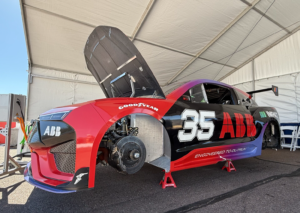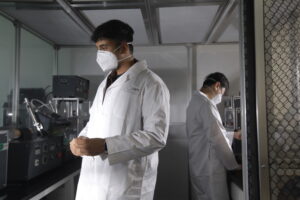Allison Giddens is president of Win-Tech, an Atlanta-based aerospace company, and a champion for Women in STEM by showcasing her path to success in manufacturing and technology.
Her tenacity and focus on creating a company that helps drive this industry forward is admirable. We recently caught up with her at the company headquarters in Marietta, GA.
Innovation & Tech Today: Tell us a little about yourself and your path to becoming President of Win-Tech.
Allison Giddens: I started working at a large corporation in Atlanta immediately out of college. I learned a lot, but quickly realized I needed to find a place I could make a bigger impact.
When I was in grade school, I pet-sat for my neighbor that owned a small business. I reached out to him for a job. He let me come in for an interview and hired me as “special projects” and administrative support. He immediately threw me to the wolves.
One of the first projects he gave me was to lean out the manual mill department. I had to learn all things “lean.” For a 23-year-old female to come in and oversee a department project with employees who were male journeymen machinists — well, that wasn’t lost on me. That could have really changed my first impression of manufacturing and its community.
The machinists were tough on me and held their standards high, but they were also patient and kind to that 23-year-old kid. They taught me a lot and that gave me the motivation to keep learning. The project was successful and the collet tree we developed is still in use today.
Over the next 12 years, I learned everything about running the business — short of running the parts — and when the founder and president of Win-Tech, Dennis Winslow, decided it was time to retire, I was ready to take the reins.
My business partner, John Hudson, and I make a great team. He is the manufacturing subject matter expert and can run any machine on the shop floor. He manages shop flow, capabilities, and monitors capacity. We complement each other’s weaknesses and trust each other’s strengths.
It has been a great journey in manufacturing, and I know the next chapter is just beginning.
I&TT: What inspired you to get involved in STEM?
Giddens: At the time, it was less about STEM and more about small business. In grade school, I gravitated towards things like Science Olympiad, asking my parents for a telescope for my birthday and exploring plants under a microscope I got for Christmas. I am a lifelong learner, and for me, it’s about seeing the pieces come together and learning what makes it tick.
Problem-solving and the constant challenges have kept me here. When I get bored, I move along, but there is nothing boring about this industry.
I&TT: What can parents do to encourage their kids to look at STEM careers? How soon do you feel we should be introducing the concepts to children?
Giddens: I applaud a lot of toy companies marketing to both boys and girls – whether it is Legos, engineering building sets, coding projects, or build-your-own robots. I think the trend is here for a while, and we introduce STEM concepts to boys and girls at pre-school.
When I was little, boys got race car sets that required their creativity to build a track. Girls got E-Z-Bake Ovens. If a young girl really wants the E-Z-Bake Oven, don’t hold her back. But figure out how to pair that with a conversation about how yeast makes bread rise, or why you can substitute vinegar for lemon juice in certain recipes. Encourage your sons, daughters, nieces, and nephews to make a mess, explore, and ask questions.
When I hear people talk about introducing STEM to young adults in high school, I cringe.
When a student enters high school, he or she may not know what they want to do for a career, but they know what they are good at (or at least, where their confidence lies) and what they like to do. We celebrate those interests much earlier in life and help them identify what those interests translate to in the workforce.
I&TT: You serve on the Women in Manufacturing Board of Directors. How can we get women to become more vocal and celebrate their place in the industry?
Giddens: It is a perfect storm. Those of us in manufacturing are busier than we have ever been. We are having to prioritize, and logically, if the efforts are not returning a profit, we wonder, “are they worthwhile?”
Meanwhile, there is a workforce shortage in manufacturing. Unless women (and men!) do not step up to the plate to actively engage with the next generation, our industry will be passed over by some of the brightest minds of the next generation.
You can’t be what you can’t see. Offer to speak (even virtually!) at your child’s school’s career day. Don’t have kids? Reach out to your local school district. I have seen county chambers and school districts work together to create a “virtual career day” library. By devoting 15-30 minutes of your day, you can record your story and share it for hundreds of students to check it out later.
Get involved in your local chamber of commerce. Represent manufacturing in your area. You can fill a business development role and become the go-to manufacturer among your peers. Develop relationships with these colleagues so they go home and tell their families about what you do.
Offer to mentor a high school student. Invite a middle school student or two to tour your facility. Ask an elementary school student to build a machine out of macaroni noodles and glue.
It’s very simple to engage the next generation and chances are, you’ll learn just as much from them as they will from you.
Women are quickly becoming the tipping point of success for manufacturing and technology. Simply put, I see the need for great acceleration in advancing technology across all STEM related industries. We simply need more talent. The solution is simple. We need more women, and we need women like Allison Giddens to be role models for the next wave. Let’s go ladies!










